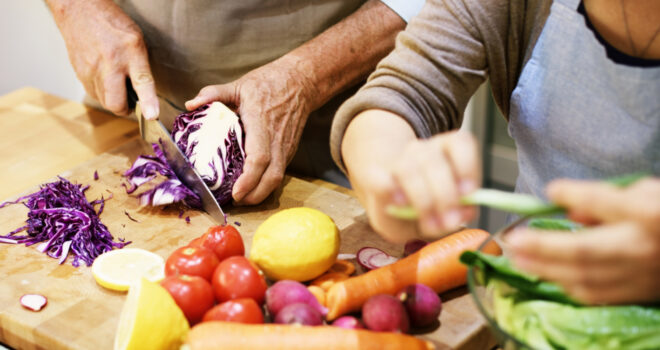Ysabelle Levasseur is also interested in nutrition problems in the elderly, which is why she plays such an active role in the Silver Fourchette project. The second part of our interview with a committed dietician-nutritionist.
You contribute to the Silver Fourchette project, which aims to reintroduce the elderly to the pleasures of eating well. Can you tell us more about some of the aspects of this project, which you find particularly important?
Ysabelle Levasseur – The dietary side of the Silver Fourchette project is designed to ensure that people continue to enjoy the pleasure of eating well as they grow older, to reduce the risk of malnutrition more than anything else. It relies on the “chef-nutritionist” pairing and is organised in every department, with the help of health insurance funds. The Silver Fourchette Tour, which is a food festival targeting the 60+ age group, is organised in many of the participating departments. The programme includes culinary competitions, conferences, panel discussions, fun culinary workshops in a caring environment, while also raising the participants’ awareness about food waste. The main objective is to develop “Senior Gastronomy” by working with caregivers and students in the culinary arts as cooking is something that unites people across generations. As a dietician-nutritionist, my job is to identify the fundamentals of nutrition for the elderly while focussing on the pleasure of eating and addressing specific needs, such as memory, hydration or muscle loss.
The ageing of the world’s population is associated with multiple nutritional challenges. Eating sufficient amounts of vegetables is one of them. How do you succeed in motivating the elderly people you meet to eat more veg?
Ysabelle Levasseur – The elderly often have digestive problems (constipation, diarrhoea…), which is why they often prefer to avoid vegetables. We can motivate them to eat more vegetables by explaining the benefits of various vegetables again and by reminding them that vegetables are a great way of increasing their calorie intake and promoting faster digestion. This generation still likes to eat soup, so we need to explain the benefits of using various colours and types of vegetables, and the advantage of choosing seasonal vegetables for more vitamins and antioxidants, which are especially important at that age. Another issue is to find solutions in terms of texture for some senior citizens, who have problems chewing and swallowing.
In Paris, I usually consult with patients in their own homes. In these low-income households, budget is a determining factor when choosing which vegetable to buy. In that case, I encourage them to buy tinned and frozen vegetables, which are practical (often the elderly have problems gripping things, which is why they find preparing fresh vegetables difficult) and have nutritional benefits. Another advantage is that you avoid the issue of fresh vegetables that are left to languish in the fridge for too long.
Check out the first part of the interview with Ysabelle Levasseur if you want a few tips on how to teach children to like vegetables!
Go to Ysabelle Levasseur’s website for the latest news from her.



 Parsley
Parsley  Radishes
Radishes  Vegetable garden: growing rapini
Vegetable garden: growing rapini 









